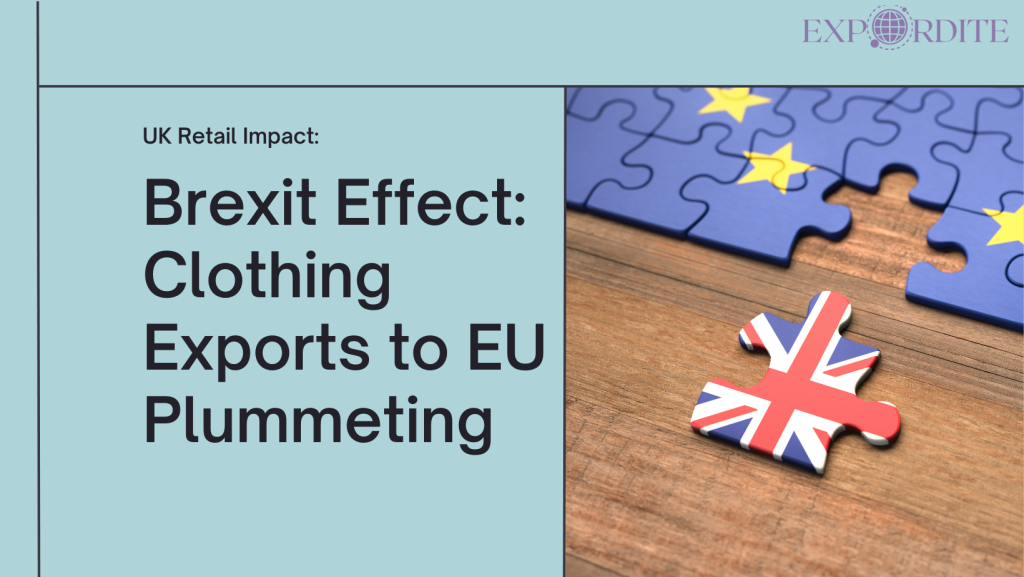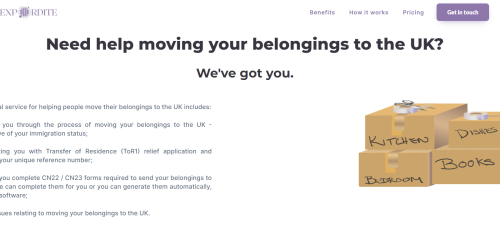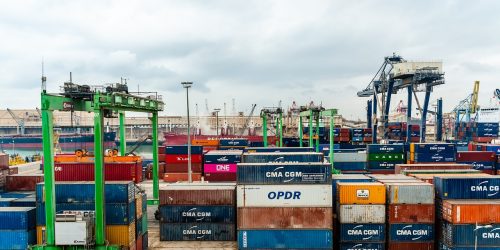10 UK Export News You Might’ve Missed – Week 23

In this edition of Export News from Expordite, we’ll cover the top 10 UK export news and headlines from week 23 of 2024 — June 3rd-9th, 2024.
Key News
General Export News
1. UK forbids export of Quantum Computers
“The UK government’s recent export restrictions on quantum devices have left quantum computing experts scratching their heads. According to insiders, these restrictions are nonsensical and lack clarity.
The legislation, which applies to both existing small quantum computers (which are deemed to serve no practical purpose) and larger ones that are yet to be developed, has effectively made their export impossible.
Unfortunately, there are serious concerns that these limits could not only hinder sales but also add a significant amount of unnecessary bureaucracy to an industry that is still in its nascent stage.
According to The Telegraph, the technology now falls under the category of “dual-use” items, which could have military applications. The Export Control Joint Unit oversees the sale of sensitive goods, and quantum computing has been added to their watchlist. Last year’s national quantum computer strategy emphasised its critical importance for defence and national security, positioning the UK in a global race to develop this cutting-edge technology.“
Source: Fudzilla
2. UK export volumes hit major low, FDF reports
“UK food export volumes have dropped to “one of the lowest levels” booked in the past 15 years, according to new findings from the Food and Drink Federation (FDF).
New data from the industry body found national food export volumes declined by more than 20% in the first quarter year-on-year to 2.2bn kilograms.
This marks the lowest level of food export volumes in the country since the first quarter 2021, when the UK food industry saw the end of the Brexit transition phase and still facing the effects of the pandemic.“
Source: Just Food
3. UK Goods Trade Down £44 Billion in Five Years – but Government Still Tries to Sell it as ‘Cause for Celebration and Renewed Pride’
“Last month, the House of Commons debated the UK’s trade performance. The then Secretary of State for Business and Trade, Kemi Badenoch, said the latest trade data, “should give everyone in this House cause for celebration and renewed pride in our country.”
“According to the latest UN statistics, the UK, outside the EU, became the world’s fourth biggest exporter in 2022,” she claimed. “Exports are now 2% above 2018 when adjusted for inflation.”
First off is inflation. According to the Bank of England, £100 in 2018 was worth roughly £125 in 2023. Data from the Office of National Statistics shows UK goods exports increasing by 7% between 2018 and 2023. But when you take into account inflation, it actually showed an 8.3% decrease – down some £30 billion.
This is, admittedly, just goods exports: service exports are up and can be examined another time. But even this drop of 8.3% of export goods needs further examination.“
Source: Byline Times
4. UK clothing sales to EU plummet as Brexit red tape deters exporters
“UK exports of clothing and footwear to the EU have dived since Brexit, according to a new study that shows the extent to which complex regulations and red tape at the border have deterred firms from sending goods across the Channel.
Exports of clothing and footwear sold to EU countries have fallen from £7.4bn in 2019 to £2.7bn in 2023, helping fuel an 18% slump in sales of all non-food goods exports to countries covered by the EU single market, according to the consultancy Retail Economics and online marketplace Tradebyte.
The report said the decline meant British brands and retailers have seen sales to the EU plummet since Brexit, despite a flourishing European e-commerce market.“
Source: The Guardian
5. UK exports could surge if SME export finance guarantee scheme promoted more effectively
“SME exports could grow if more companies were aware of and using ‘GEF’ – the General Export Facility – a relatively unknown but valuable government scheme designed to boost Britain’s SME exports by providing an 80% guarantee to banks for loans to businesses specifically engaging in exports.
GEF is one of several export finance initiatives overseen by the government’s Export Credit Agency which in 2023 provided around £6.5 billion of financial support to UK exporters.
The GEF scheme, however, is a relatively unknown element of the overall financial support provided to exporters and is failing to achieve any real impact across the SME sector, its main target market and where there is considerable potential to drive export volume, according to a leading business finance specialist with UK top ten accountancy and advisory firm Azets.“
Source: London Loves Business
6. UK says its new trade scheme still in force in Nigeria
“The British High Commissioner to Nigeria, Richard Montgomery, has declared that the United Kingdom’s ambitious Developing Countries Trading Scheme (DCTS) which launched last year and puts in place simpler and more generous trading terms for Nigeria is still in force.
Launched last June, the DCTS offers Nigeria one of the most generous sets of trading preferences in the world. The scheme cut tariffs for Nigeria so that over 3000 new products are duty-free.“
Source: Business Day
7. UK retail sales to EU drop £5.9 bn since Brexit; clothing exports fall
“Despite a flourishing European e-commerce market, British brands and retailers have seen sales to the European Union (EU) drop by £5.9 billion (~$7.54 billion) since Brexit, according to Tradebyte research conducted in partnership with Retail Economics.
Though online retail is projected to add £323 billion (~$413 billion) of annual sales to EU economies, additional trade frictions due to Brexit-linked complications are curtailing this international sales opportunity for UK-based brands and retailers.
The value of non-food retail exports has fallen by almost 18 per cent since 2019. The UK non-food export environment, particularly in the clothing and footwear sector, has faced significant challenges after Brexit, with exports in this category falling from £7.4 billion (~$9.46 billion) in 2019 to just £2.7 billion (~$3.45 billion) in 2023.“
Source: Fibre2Fashion
8. FOOD EXPORT VOLUMES ‘CONCERNING’ AMID 20% DECLINE
“UK food export volumes have fallen by over 20% on the year between January and March 2024 as rising costs and the global economic slowdown impact trade.
The latest data from the Food and Drink Federation (FDF) found that this represents the lowest first-quarter volume in the past 15 years, except for the first quarter of 2021 which was hit by the global pandemic.
The total export value of food and drink for the first quarter of 2024 stood at £5.7bn, falling 5.3% when compared with the same period the previous year.
Currently, Ireland remains the UK’s largest export market, despite a fall of 3.5% to £1bn.“
Source: Grocery Gazette
9. In data: Significant opportunity in online marketplaces post-Brexit
“Figures from the report, which urge UK brands and retailers to explore the opportunities being offered in the online marketplaces space, indicate that the value of non-food retail exports, including apparel, has fallen by almost 18% since 2019, despite inflation softening the decline.
The report explained that the UK’s non-food export environment, particularly in the clothing and footwear sector, has faced significant challenges post-Brexit. Exports in this category have plummeted from £7.4bn in 2019 to£2.7bn in 2023.
The report highlights that amidst challenges, digital marketplaces have risen as crucial enablers of growth, providing a platform for innovation and access to wider markets.
It views online marketplaces, which reportedly account for over two-fifths of the EU’s £322.6bn annual online non-food sales, as a streamlined path to access “affluent and younger consumer demographics.“
Source: Just Style
10. EU’s crisp flavouring ban could create ‘smoky bacon’ border
“Northern Irish crisp makers will be subject to an EU ban on smoke flavourings because of post-Brexit trading arrangements that could create a “smoky bacon border” with Britain.
The EU’s food safety authority said toxicity concerns about some eight smoke flavourings, including those used for smoky bacon crisps, were “either confirmed or can’t be ruled out.”
As a result Brussels has not renewed market authorisations for the flavourings to be used.
Under the terms of the Windsor Framework, Northern Ireland continues to follow hundreds of EU rules and has access to the EU’s single market unlike the rest of the UK.
It means manufacturers such as crisp giant Tayto cannot now use the affected smoke flavourings at its County Armagh headquarters in Northern Ireland.“
Source: The Telegraph
Want to get more international trade content straight to your inbox?






